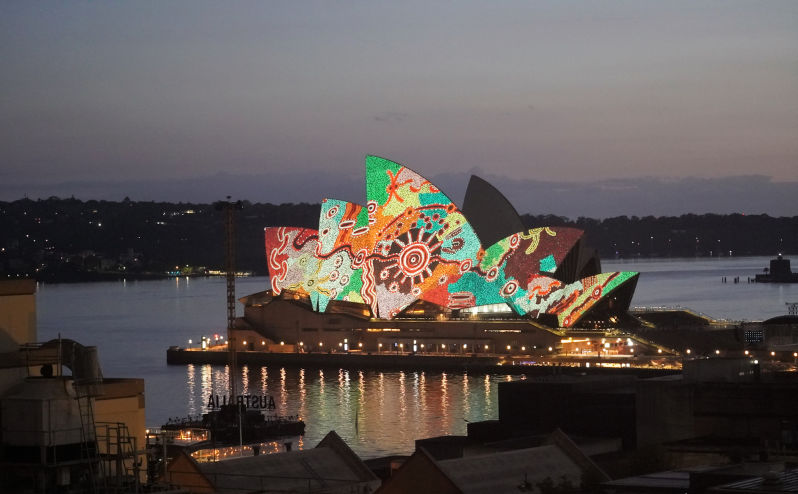The Voice: through the disinformation to the source of opposition
October 10, 2023
On Saturday, 14 October, Australians will vote on a seemingly inoffensive change to their Constitution. Why is it meeting such opposition? The case of the destroyed site at Juukan Gorge offers a hint. Are Australian mining companies, with such a poor record of respecting the voice of aboriginal communities, the true source of opposition?
In 1770, James Cook mapped the east coast of the Australian continent, landing in Botany Bay. In 1853, the NSW governor of the British settlement founded there would proclaim the continent terra nullius, or owned by nobody, despite the obvious presence of human civilisation.
Thus began a tradition of contradiction toward Aboriginals in Australia. As well as being massacred and decimated by disease, Aboriginals were employed by white settlers, and so liable for income and other taxes, military service and other obligations, but could not vote in federal elections until 1962. A misguided mid-nineteenth century effort to improve their prospects took Aboriginal children from their families to be raised by white Australians, the idea being to breed out their Aboriginal traits and assimilate them into the white community. While this policy persisted well into the 1960s, nobody knows how many children were affected, as Aboriginals were included in national population figures only from 1967.
Demands by Aboriginal groups for more recognition have been sporadic and mild, and consistently conducted through legal channels. Government and societal responses have been similarly sporadic, even halting. A well-cited example is the Mabo ruling of 1992, overturning terra nullius, and recognising of Native Title in parallel with European-style ownership. The Court reasoned that that Indigenous rights to land existed by virtue of traditional customs and laws, and that those rights had not been wholly lost upon colonisation. Yet no treaty has ever been concluded between Aboriginal groups and the heirs of the eighteenth-century British settlers, as it was with New Zealands Maoris in the 1840 Treaty of Waitangi.
Meanwhile, the rights of Aboriginal groups have frequently been trampled on. The legal destruction at Juukan Gorge in 2020 to expand an iron ore mine, is a high-profile example how cultural heritage laws at the Commonwealth, state and territory levels have failed to incorporate recognition of the rights of Aboriginals to land and waters. So, it is understandable that Aborigines want some formal assurance that their views will be heard on matters that affect them.
While the proposed change to the Constitution is for a purely advisory body, with no veto power, it is meeting surprising levels of opposition. As with many democratic processes around the world these days, the core arguments are being clouded by misinformation and propaganda, often emanating from beyond Australian shores.
Sifting through this can be tricky, as few people have enough direct experience with Aboriginal issues to make considered and informed choices. But some thought can help decipher arguments from hysteria.
One issue is who should count as an Aboriginal, to which there is no infallible answer, not least because the policy of removal from their families has left few who are not of mixed race. But the proposed wording Members of the Voice would be selected by Aboriginal and Torres Strait Islander communities. and suit the wishes of local communities… would probably pass the reasonable person test in common law and is not inconsistent with principles in international law.
It is of course, unfortunate that there seems a need to distinguish between Aboriginals and other Australians, and we would love to pretend that all Australians are treated equally. But that patently is not the case: rates of conviction for petty crime tell a story of deprivation and discrimination, as do the education and health services available to Aboriginals.
Could The Voice be a wedge issue: a benign question that opens the way to bigger, less reasonable demands? It is hard to see how, as the proposed wording embeds the principle of an advisory opinion and expressly rules out any veto power.
So, what are the real issues here? The case of the destroyed site at Juukan Gorge offers a hint. A glance at a map of Australia shows that many of the most important deposits of nickel, chromium, vanadium, molybdenum and manganese, as well as iron ore and precious metals, such as gold and silver, coincide with remote areas where Aboriginals make up a large proportion of the population, especially in western and north-western Australia.
As demand for those minerals explodes with the transition to clean energy, some are bound to see accommodating Aboriginal interests as a sure way to slow down projects and even to reduce their profitability. In some cases, it could also sway public opinion, which may result in popular demands for more recognition or even compensation by mining groups to those Aboriginals. In view of mining firms generally poor record to date in respecting their engagements, compensating Aboriginal groups and meeting promises to restore land to its previous condition, this could pose problems for mining firms seeking leases in the future.
The source of opposition to this referendum proposal now could look rather different, especially in the context of great-power rivalry for control of supply chains of critical minerals.
Will Australians be able to see through the disinformation to what is really at stake?
